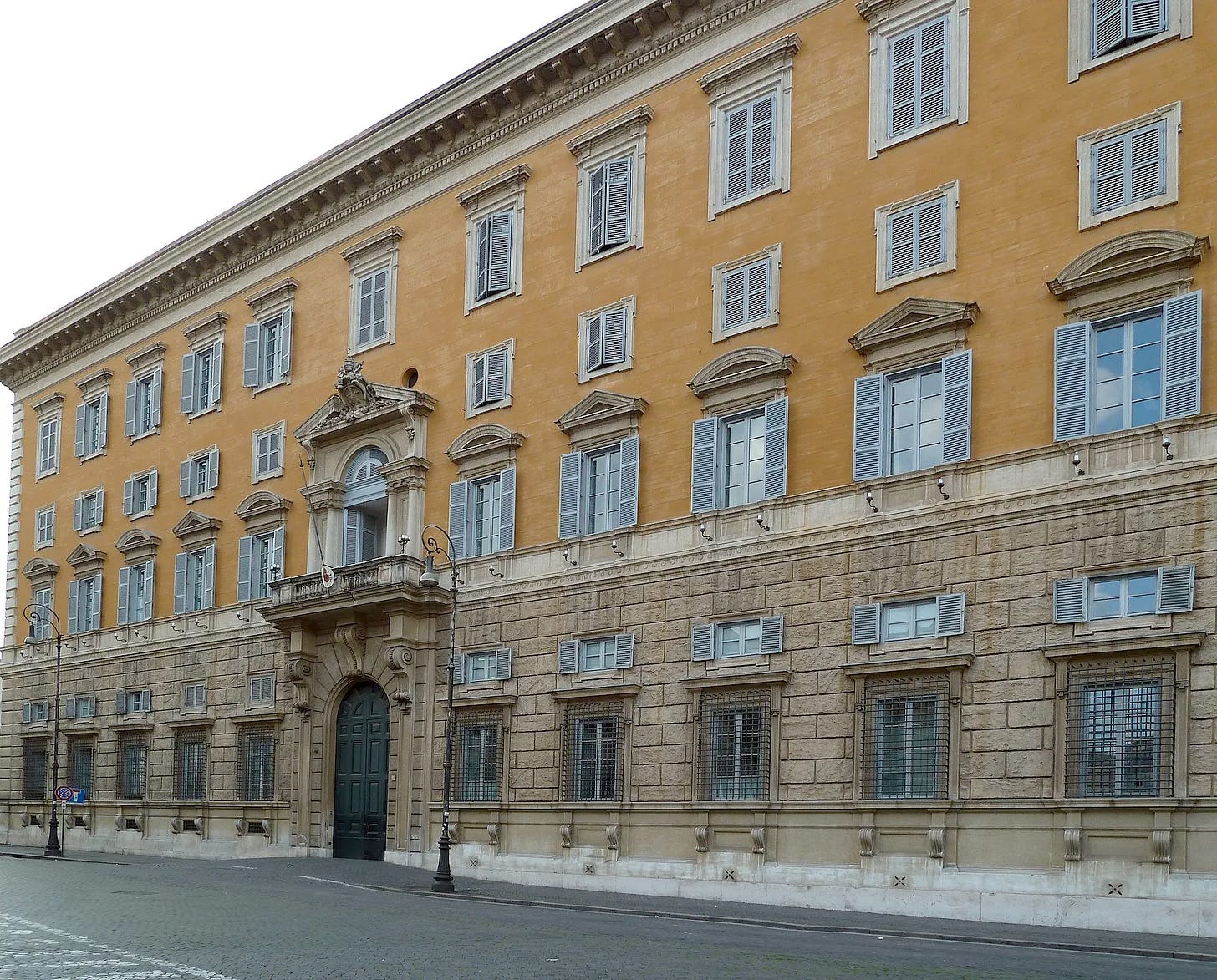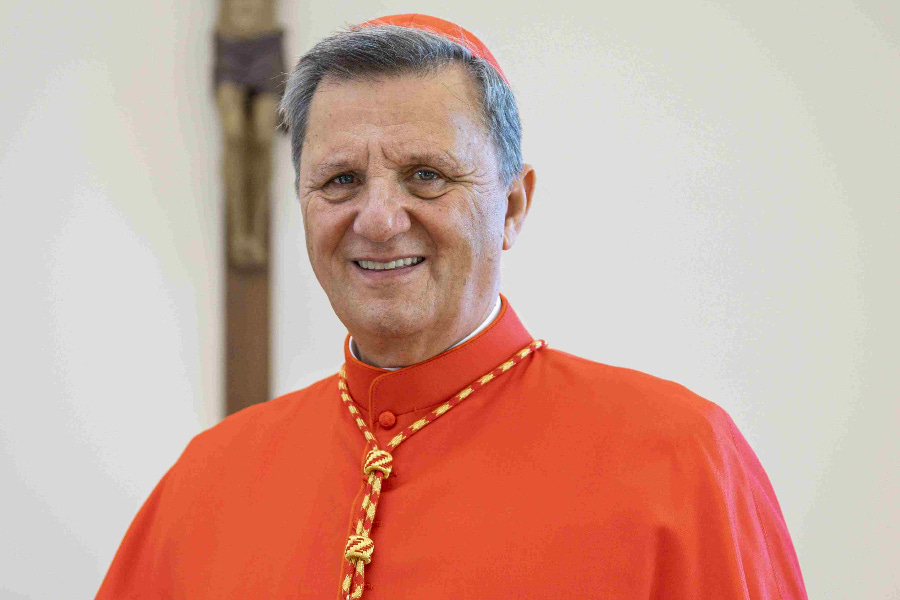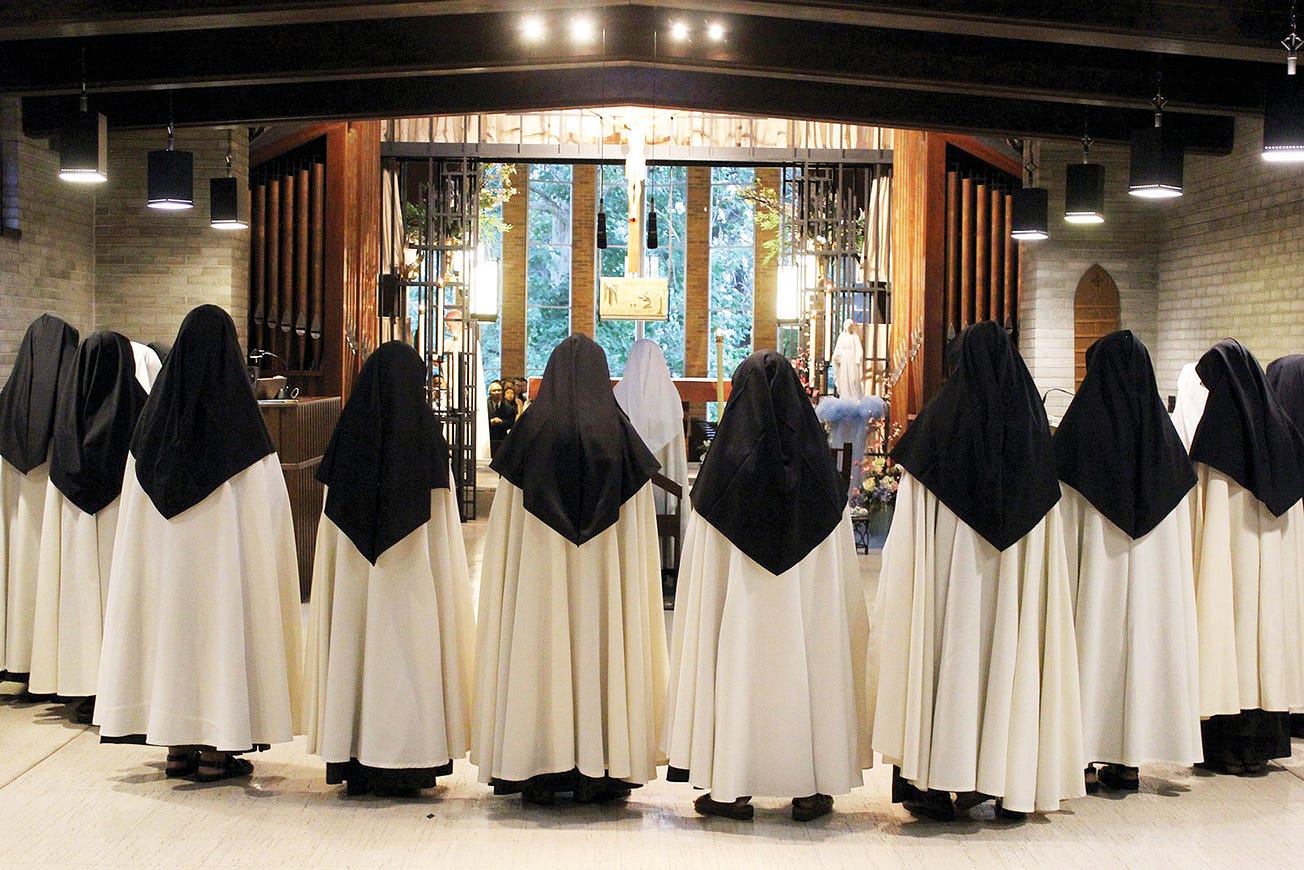The Dicastery for the Doctrine of the Faith issued on Tuesday a “clarification” on the limits of its competence to prosecute canonical cases of clerical abuse against “vulnerable adults.”
Palazzo del Sant'Uffizio, the seat of the Congregation for the Doctrine of the Faith. Credit: Jim McIntosh via Flickr. CC BY SA 2.0
“The Dicastery for the Doctrine of the Faith – since 21 May 2010 – has acquired competence to treat the crimes against the sixth commandment of the Decalogue committed by clerics with people who habitually have imperfect use of - reason [emphasis original],” the dicastery’s Jan. 30 clarification reiterated.
“Following the promulgation of the motu proprio Vos estis lux mundi… the concept of vulnerable adult has been introduced into the canonical order, which includes ‘every person in a state of infirmity, of physical deficiency or Psychic, or deprivation of personal liberty, but also Occasionally, it limits its ability to understand or to want or otherwise resist the offense,’” the document continued.
“In this respect, it should be remembered that the definition of adult vulnerable integrates more extensive cases than the competence of the DDF, which remains limited, [emphasis original] in addition to minors under the age of eighteen, to those who have an habitually imperfect use of reason. Therefore, the other cases apart from these cases, they are treated by the [other] competent dicasteries, as described in art. 7 VELM.”
The short text is not a change in legal policy, though it had been understood that way even by some seasoned Vatican-watchers.
But while Vatican departments, most notably the DDF and the Dicastery for Divine Worship, have sometimes issued changes to law or policy under the heading of “clarifications,” Tuesday’s text was actually just a basic recitation of the status quo at the Vatican.
The note was issued one day after DDF prefect Cardinal Victor Manuel Fernandez met in audience with Pope Francis.
While there has been no public indication that the release was related to the meeting, there has actually been no indication of why the clarification was issued at all.
So after several years of supposedly clear and settled policy about cases involving “vulnerable adults” are supposed to be handled, who needs to be reminded?
Well, maybe everyone?
—
Since the McCarrick scandal of 2018, the notion of a “vulnerable adult” in canon law had been debated and discussed frequently among the Church’s policy experts.
McCarrick was accused of sexually assaulting or abusing both minors, those under 18 years of age, and adults, often young men under his ecclesiastical authority. And the Church had to discuss how exactly his abuse of adults should be handled.
The Dicastery for the Doctrine of the Faith has long carried responsibility for investigating clerical sexual abuse of minors, which Pope Benedict XVI defined as both a moral crime and a spiritual offense against the faith itself.
That dicastery also has a definition for cases involving adults under its purview. The definition is very narrowly drawn to include only those with severe intellectual, developmental, or psychological disabilities, which consistently and significantly impede their use of reason.
In the fallout of the McCarrick scandal, many prominent Church figures, called for the legal category of “vulnerable adults” to be broadened — to include cases in which a disparity of power and spiritual authority became a means of coercing adult victims.
In 2018, Cardinal Séan O’Malley of Boston, president of Pope Francis’ Pontifical Commission for the Protection of Minors, advocated for a wholesale expansion of the Church’s legal category of vulnerable adults.
In November 2018, O’Malley told the U.S. bishops’ conference that "I think we need to extend [the definition] to adults who can be the victims of abuse of power."
O’Malley’s proposed change would have seen a broad range of cases, including those involving the abuse of seminarians and Church employees, treated as legally equivalent to the sexual abuse of a child.
It was opposed in the November 2018 meeting by Cardinal Blase Cupich of Chicago, who was heavily involved in the drafting of Vos estis, released some six months later.
Cupich argued that “in some of the cases with adults involving clerics, it could be consensual sex, anonymous [sex], but also involving adult pornography.”
“There is a whole different set of circumstances that need to come into play here as it is examined, and a whole different skill set as well," Cupich argued in 2018.
“I would strongly urge that [the categories of minor and vulnerable adult] be separate because it's a different discipline.”
In the norms of Pope Francis’ 2019 Vos estis lux mundi, Cardinal Cupich’s view won out.
Vos estis, however, did create a new legal category of “vulnerable adult” — defined as “any person in a state of infirmity, physical or mental deficiency, or deprivation of personal liberty which, in fact, even occasionally, limits their ability to understand or to want or otherwise resist the offense.”
That new category was significantly broader than the DDF’s operative legal definition.
And that created a jurisdictional challenge. After Vos estis was promulgated the DDF made clear that its legal mandate to deal with abuse cases was limited to abuse involving minors, and those with disabilities. Cases under the new category of vulnerable adult would fall outside of the dicastery’s remit.
The DDF said that “vulnerable adult” cases as defined by Vos estis were to be handled locally or, if necessary, sent to other dicasteries of the Roman curia, usually the Dicastery for Clergy or the Dicastery for Institutes for Consecrated Life and Societies of Apostolic Life (DICLSAL).
“With regard to the use of the term ‘vulnerable adult,’ elsewhere described as ‘any person in a state of infirmity, physical or mental deficiency, or deprivation of personal liberty which, in fact, even occasionally limits their ability to understand or to want or otherwise resist the offence’, it should be noted that this definition includes other situations than those pertaining to the competence of the [DDF], which remains limited to minors under eighteen years of age and to those who ‘habitually have an imperfect use of reason.’ Other situations outside of these cases are handled by the competent Dicasteries,” the DDF said.
When Pope Francis promulgated in 2021 a new version of Book VI of the Code of Canon Law, he made even more clear the distinction between two notions of “vulnerable adult.”
In the revised canon 1398, the law recognized two distinct categories of “a person who habitually has an imperfect use of reason [equivalent to a minor],” on the one hand, and on the other: “one to whom the law recognises equal protection” under the definition of Vos estis.
While these different categories might appear to be distinctions-without-difference, they carry with them very different legal requirements about how a case is handled, by what authority, and what punishments can or should be imposed in cases of abuse.
—
High level debate has continued in the Church about how “vulnerable adults” should be considered in dealing with cases of clerical sexual misconduct.
Opinion is settled that a substantive distinction to be drawn between the sexual abuse of a minor and the sexual coercion of an adult, and that this should be reflected in the law of the Church.
But how to treat different classes of adult victims has remained a live issue — as has the legal utility of the broad category created by Vos estis.
Fr. Hans Zollner, SJ, a founding member of the Pontifical Commission for the Protection of Minors and for years the Vatican’s de facto expert spokesman on issues of abuse reform, has repeatedly indicated that he believes the definition of vulnerable adult in Vos estis is unworkable, and even unhelpfully broad.
The priest, who has previously said he was not involved in drafting the legal definition of “vulnerable adult,” has publicly questioned the broad application of the term, and argued that it detracts from sound application of the law.
“Do you really want to be a 'vulnerable person' [just] because you are a woman and because you are a parishioner? I don't think so,” Zollner told a public Q&A session on abuse reform last year, shortly before announcing his surprise resignation from the pontifical commission and disaffection with its work and progress.
But advocates for victims of clerical coercion or sexual manipulation say the Church should continue to recognize legally the way in which spiritual authority or imbalances of power can impact consent.
Debate about the scope of Vos estis’ definition of a “vulnerable adult” is likely to continue.
But even on a far narrower question — namely, when adults are so vulnerable as to be equivalent in law to minors, and therefore under DDF jurisdiction — there have been signs of confusion at the top of the Church — despite the apparent clarity of the DDF’s own proper law.
As part of those changes, the text of canon 1453 of the CCEO was revised, with the apparent intention of bringing it into line with the previously revised canon 1398 of the Latin code.
However, while Latin code makes reference to “a minor or with a person who habitually has an imperfect use of reason” as being equivalent in law (in line with the DDF’s established standard of someone with mental illness or a developmental disability), the new canon 1453 uses different language.
The new law for the Eastern Catholic Churches refers instead to minors and “persons who habitually lack the use of reason” rather than merely having an habitual imperfect use of it.
While to the general reader this might appear to be a distinction without difference, it is, in fact, a distinct legal category all of its own.
In both the Latin and Eastern codes, a person who lacks the use of reason altogether is deemed non sui compos and equivalent in law not to a minor (under the age of 18) but to an infant — someone under the age of seven years old.
The result of the new CCEO terminology, then, appears to be the creation of yet another new legal standard for cases of clerical abuse involving adults, in which an adult has to exhibit an absolute inability to reason, in order for an abuse case to be treated by the DDF.
The upshot of it all is that, while the leading experts on the Church’s attempts at abuse reform appear to disagree among themselves on who is a vulnerable adult, and how vulnerable they are, between Sacramentorum sanctitatis tutela, Vos estis lux mundi, the Latin Code of Canon Law, and the Code of Canons for the Eastern Churches, there now exist four separate legal categories for adult victims of clerical sexual abuse, none of which appear to perfectly overlap with the others.
—
It would be nice to think the DDF’s Jan. 30 clarification was aimed at informing and reminding the Church generally — perhaps even including the Vatican press corps — of an important legal issue of which they were already aware, and eager to stay informed about.
But the reality is that the note of clarification is probably aimed at those who, really, ought to know better, including bishops.
From the outside looking in, it might be tempting to wave off concerns about the Vatican’s seemingly incoherent, overlapping, and at times contradictory legal definitions as “their problem.”
If a particular case seems thorny, or if the relevant legal texts don’t seem to hang together, some diocesan bishops might expect that it's a problem for the dicasteries to sort out among themselves. The job of the local bishop and chancery, many might assume, is simply to receive an accusation and put it in the mail for Rome to investigate and adjudicate.
But that is not the case.
Cases of clerical sexual abuse which fall under the DDF’s competence concern “reserved delicts” in canon law. That is to say only the DDF can decide what to do with them, and they cannot be treated by local ecclesiastical authorities without authorization from the dicastery.
Historically, that practice came about at the end of the 20th century because it was demonstrated that in many dioceses, notably in the United States, local bishops were not prosecuting crimes of sexual abuse of minors at all, but instead applying “pastoral” solutions to cases, which often involved silencing victims and moving offender priests to different assignments after periods of therapy.
Roman officials, however, have repeatedly complained privately that some dioceses continue to refer any and all cases involving suspected clerical abuse to the Vatican, regardless of the circumstances and the specific competence of the dicasteries involved.
At the same time, public confusion has also arisen about which cases the DDF handles, and why, following coverage of high profile scandals like that of Fr. Marko Rupnik, formerly S.J., the fashionable religious artist accused of serially sexually abusing religious sisters over a period of decades.
The DDF quietly convicted Rupnik in 2021 of the specific crime for which he’d been referred — attempting to sacramentally absolve a sexual partner, which is a crime reserved to the dicastery by SST.
Canonical legal procedure, however, allows the dicastery to consider other alleged crimes connected to cases reserved to it, and the dicastery also found that the canonical statute of limitations had expired on other accusations against Rupnik, including allegations that could be considered his sexual abuse of vulnerable adults.
While the DDF was widely criticized for not pressing through with Rupnik’s laicization at the time, it has since been pointed out that his former order, the Society of Jesus, could have worked with DICLSAL to affect his laicization if they had so wished.
Instead, the Jesuits opted to expel Rupnik from the society and he then was incardinated by the bishop of his home diocese in Slovenia, though he now faces renewed canonical prosecution after Pope Francis waived the statute of limitations on the case and referred it back to the DDF, presumably as the dicastery which first had jurisdiction over his case, even though the crimes for which he is now being prosecuted may not be reserved to it, necessarily.
—
Cases like Rupnik’s, together with poorly drafted legal texts, have combined to create the general expectation that anything touching abusive clerical sexual misconduct is the DDF’s problem to deal with, whatever the law might actually say.
However, as U.S. bishops were reminded in 2021 by Archbishop Charles Sciccluna, a senior canonist and adjunct secretary of the DDF, cases involving the abuse of “vulnerable adults” under the norms of Vos estis lux mundi are the responsibility of local bishops — and they can be held canonically liable for failing to prosecute them.
Other dicasteries, including the Dicastry for Bishops when a bishop is directly implicated, may have primary responsibility in some cases, but the general expectation in law is that local cases involving vulnerable adults should be handled locally.
Those cases could include coercive sexual harassment of seminarians by priests or formators, as well as sexual contact between a priest and someone employed by them or under their pastoral care — but such cases of clerical sexual misconduct with adults are often treated at the diocesan level as moral failure, but not canonical crimes.
The need for bishops to take an active role in policing and prosecuting crimes under VELM was emphasized by Pope Francis in his apostolic constitution promulgating the new Book VI in 2021, in which he wrote that the proper application of penal law “is a task that cannot in any way be separated from the pastoral munus entrusted to [diocesan bishops].”
“In the past, the lack of perception of the intimate relationship existing in the Church between the exercise of charity and the recourse - where circumstances and justice so require - to sanctioning discipline has caused much damage,” Francis said.
All this taken together, the DDF’s Jan. 30 clarification doesn’t represent a change in the law, or or how it should be applied and interpreted.
Rather, it might better be understood as an impatient reminder that the DDF does not bear sole responsibility for handling cases of clerical sexual abuse, and a prompt for other authorities in the Church to start pulling their weight.





